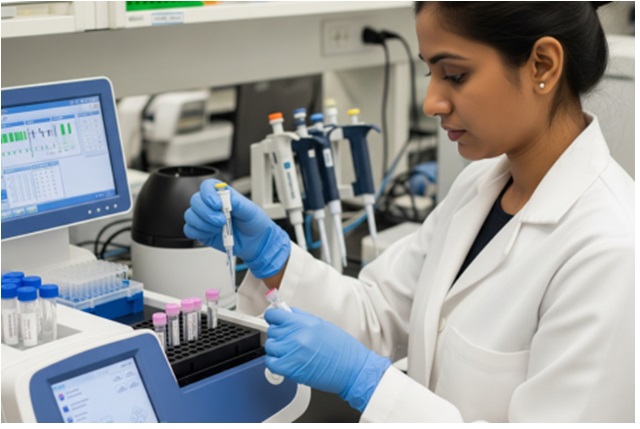EGFR or epidermal growth factor receptor is a transmembrane protein found on the surface of cells. It is a part of the family of receptors, known as the ErbB family. It helps in cell growth, division, and survival.
For normal functioning of cells, EGFR is crucial. However, overproduction or mutation can lead to various diseases, including cancer. In such cases, EGFR sends constant signals for cell growth, even when it shouldn’t. This leads to uncontrolled cell growth, which is a common sign of cancer.
EGFR mutations are common in non-smokers, women, patients of East Asian descent, and those diagnosed with adenocarcinoma subtype of non-small cell lung cancer (NSCLC).
While EGFR contributes to various types of cancers, it plays a crucial role in non-small cell lung cancer (NSCLC). Among different types of lung cancers, NSCLC cases account for approximately 85%.
The most common mutations include:
- Exon 19 deletions (Del19)
- Exon 21 L858R point mutations
These mutations make cancer cells sensitive to EGFR tyrosine kinase inhibitors (TKIs), such as gefitinib, erlotinib, and osimertinib. As a result, it can accelerate tumor growth. That is why detecting EGFR mutations, especially at an early stage, is crucial to manage lung cancer. Here is where PCR amplification kit comes into play.
What is PCR?
PCR stands for Polymerase Chain Reaction. It is a molecular biology technique used to amplify small segments of DNA. It allows scientists and clinicians to detect even tiny amounts of genetic mutations in a sample.
PCR amplification kits are widely used in cancer diagnosis due to high speed, sensitivity, and accuracy.
There are different types of PCR methods used to detect EGFR mutations, including:
- Conventional PCR
- Real-time PCR (qPCR)
- ARMS-PCR
- Digital PCR (dPCR)
The basic steps of PCR include:
- Denaturation
- Annealing
- Extension
Multiple cycles of PCR are used to produce millions of copies of a specific DNA region. The amplified DNA can then be analyzed for mutations.
Applications of PCR in Lung Cancer EGFR Mutations
Early Detection of EGFR Mutations
PCR helps in finding EGFR mutations at an early stage of the disease. Lung cancer may not show clear signs at first, so testing DNA from tissue or blood samples can reveal if EGFR is mutated. This early detection gives clinicians a chance to start treatment quickly. Starting treatment sooner often means better outcomes for the patient.
Choose the Right Targeted Therapy
Once an EGFR mutation is found, clinicians can use this information to choose the best medicine. Some drugs, called tyrosine kinase inhibitors (TKIs), work well against certain EGFR mutations. These drugs include gefitinib, erlotinib, and osimertinib. PCR helps find the exact mutation, so the clinician can match the patient with the drug that works best. This is called targeted therapy. It increases the chances of success and reduces unnecessary side effects.
Detect Drug Resistance
Over time, lung cancer cells can change again and stop responding to treatment. One common resistance mutation is called T790M. This change can make first-line drugs less effective. PCR helps clinicians and researchers find these new mutations. Once the new mutation is identified, treatment can be changed to another drug, such as a third-generation TKI that still works against the resistant cancer.
Use Liquid Biopsies for Non-Invasive Testing
Sometimes it is hard to get a sample of the tumor through surgery. In such cases, clinicians can use a blood sample instead. This is known as a liquid biopsy. PCR can test the blood for small pieces of cancer DNA and detect EGFR mutations. This method is easier for the patient and can be done multiple times to keep track of the cancer over time.
Find Minimal Residual Disease
Even after treatment, a few cancer cells may stay in the body. This is called minimal residual disease. It can be hard to detect with regular tests. However, digital PCR is a very sensitive method that can find tiny amounts of mutated DNA. This helps doctors know if more treatment is needed to stop the cancer from returning.
Understand Tumor Diversity
PCR can also show that not all parts of a tumor are the same. Different areas may have different mutations. This is called tumor heterogeneity. Knowing about these differences helps explain why some treatments only partly work or why cancer may return. PCR gives a clearer picture of the cancer, helping doctors make better decisions.
Help in Clinical Trials and Research
PCR is used in research to find better treatments. It helps scientists choose the right patients for clinical trials. It also helps track how well new drugs work. By studying EGFR mutations through PCR, researchers can learn more about lung cancer and find new ways to treat it.
The Bottom Line
PCR has revolutionized the way we detect and manage EGFR mutations in lung cancer. With its unmatched accuracy and speed, PCR helps clinicians detect mutations early, choose the right treatment, monitor for resistance, and even perform non-invasive testing.
EGFR mutation testing is now a standard part of NSCLC diagnosis. PCR ensures that these tests are fast, reliable, and affordable. As lung cancer treatments continue to evolve, PCR remains a powerful tool in precision medicine, giving patients the best chance at a longer, healthier life.
However, before you go ahead, make sure you buy a PCR amplification kit from a reliable source.
